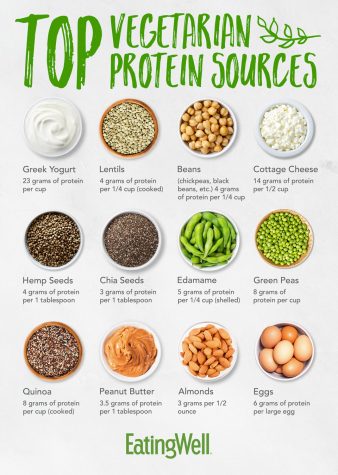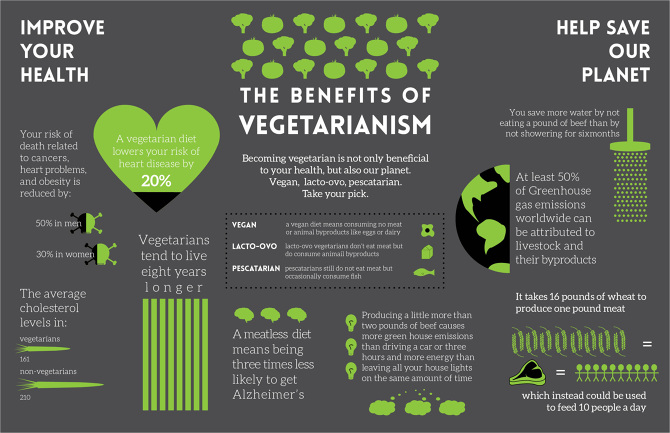Go Greener
http://www.foodielovesfitness.com/wp-content/uploads/2014/08/vegetarian-infographic.jpg
The benefits of a vegetarian lifestyle.
In 2015, a national survey found about eight million American adults practiced a vegetarian diet, and this number has only gone up since then.
Vegetarianism has been continuously on the rise in recent years because of the acclaimed health benefits correlated with this diet. A vegetarian is someone who removes all meat, including fish, from their everyday diet. A common misconception is vegetarianism is the same as being vegan, which is when a person removes all meat and dairy products from their diets.
Simply removing meat from one’s diet is a small change that has resulted in numerous tested health benefits including weight loss, decreased risk of heart disease, and less risk for two types of cancer, thus leading to a prolonged life expectancy. This is because many vegetarian foods tend to be lower in saturated fats and higher in fiber than meat-based foods.
Dr. Cindy Pan, a practitioner who specializes in women’s health claims a good diet consists of, “variety, balance, adequate nutrient content, sufficient but not excessive kilojoules and an optimal balance of carbohydrates, protein, and fat.” If a person chooses to adopt this way of life, they must incorporate all of the necessary food groups to still obtain the vitamins and nutritional value found in meat. Although, this diet is very beneficial as many people who participate in a vegetarian diet end up eating a wider variety of plant-based foods which also lead to a healthier lifestyle and more energy to be productive.
“When I hear “vegetarian” I think of people who can only eat plants and vegetables, and also cannot consume dairy products,” said senior Zach Adams.
Another common misconception associated with being a vegetarian is that they are iron deficient and lack protein in their diets because of the elimination of meat. However, this is not true, because vegetarians do receive both protein and iron from other sources. The vegetarian diet does not completely eliminate dairy products, so many still receive protein benefits from eggs, milk, and cheese. Additionally, protein is abundant in beans, whole grains, soy products, and nuts. Iron is also present in many plant-based protein sources, like lentils, white beans, and spinach. One of the primary reasons vegetarians are proven to lead healthier lifestyles is because they are forced to consume many other plant-based foods in order to get their daily dose of protein and iron.

Vegetarian foods that are high in protein.
So, why go vegetarian? Contrary to what many medical professionals claim, this diet can be very beneficial to one’s mental and physical health, as Clueless actress and vegan proponent Alicia Silverstone shares, “Nothing’s changed my life more. I feel better about myself as a person, being conscious and responsible for my actions, and I lost weight and my skin cleared up and I got bright eyes, and I just became stronger and healthier and happier.” Becoming a vegetarian is a major lifestyle choice that can greatly alter your appearance, mood, and increase your level of activity. The only question is, is it worth it for you?










